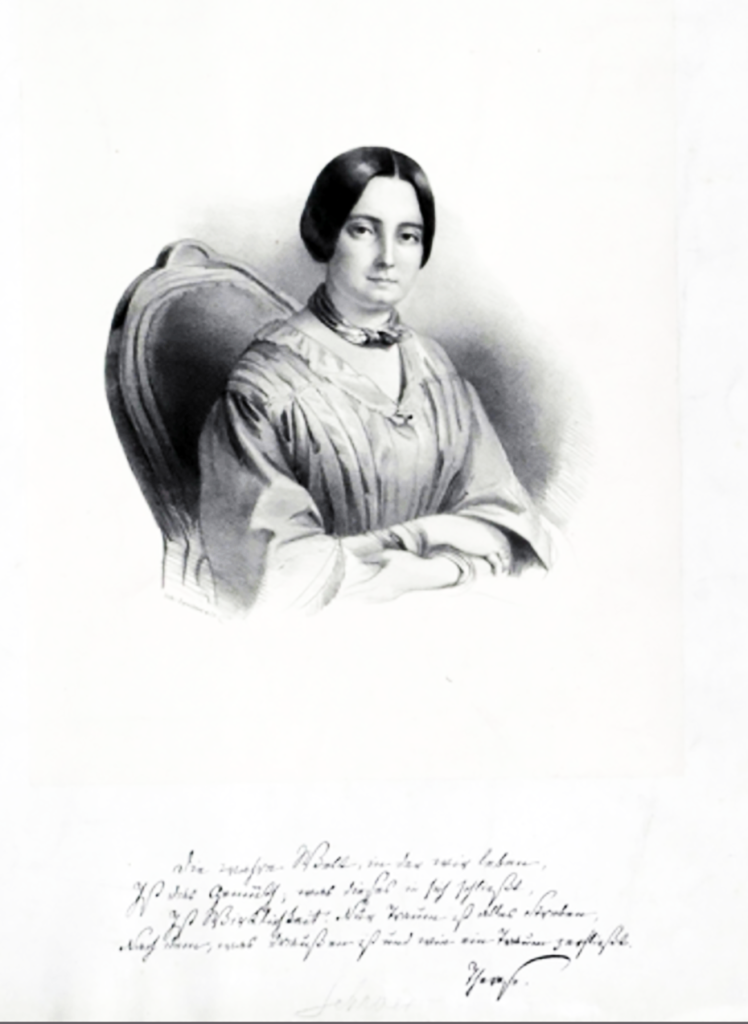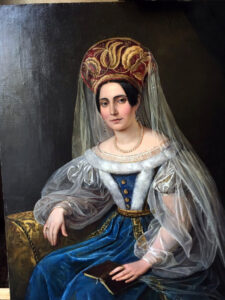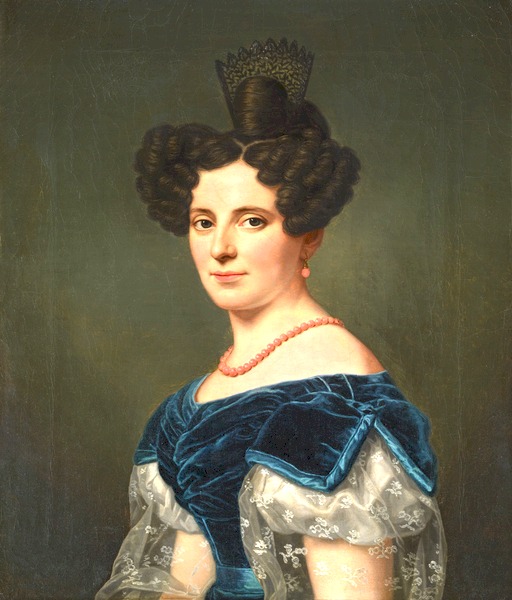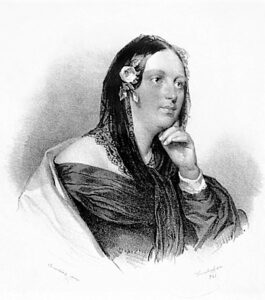
Therese Henriette Antoinette Elisabeth Struve (1804 – 1852) was the daughter of Heinrich Christian Gottfried and Elisabeth Wilhelmine Sidonie (von Oexle Friedenberg) Struve (1780 – 1837). Therese married: 1) Robert Gabriel von Bacheracht (1798 – 1884) [divorced and then partner of Karl Gutzkow (1811 – 1878)] married 2) Heinrich von Lützow (1807 – 1879).
The following is translated from German Wikipedia:
Therese was born as the daughter of the Imperial Russian Legation Secretary and State Councilor Heinrich von Struve and Elisabeth Wilhelmine Sidonie Countess Oexle von Friedenberg in Stuttgart. Her mother, Elisabeth Wilhelmine Sidonie von Oexle (1780–1837, Countess von Friedeberg, was friends with the writer Therese Huber, one of the Göttingen “university ladies and gentlemen”, and who was the godmother and namesake of the girl. Her cousin Gustav Struve became known as a revolutionary during the March Revolution of 1848/49.
In 1805 the family had to flee from Stuttgart to Greitz in Vogtland during the Second Napoleonic War. In 1809 they settled in Kassel, where her father held a post as the first secretary of the embassy at the newly founded Westphalian court. During another political crisis, namely Napoleon’s campaign against Russia, the family had to retreat to St. Petersburg. There, Therese attended a renowned imperial school for noble girls. Russian was compulsory there, and knowledge of that language would later give her access to the St. Petersburg cultural scene.
In about 1814 the family moved to Hamburg, where her father had received a Russian legation post. Here she frequented the first social circles. She was praised by contemporaries for her beauty and valued for her conversational talents. In Weimar, where she was sent at the age of 16, she made the acquaintance of Johann Wolfgang von Goethe.

In 1825 she entered into a marriage of convenience with the wealthy Imperial Russian State Councilor, Legation Secretary and Consul General Robert von Bacheracht (1798-1884). But, before this the 21-year-old had to renounce her childhood sweetheart, cousin Heinrich von Lützow whom she had hoped to marry. The only son from her marriage to Bacheracht died early.
In the autmn of 1841 she met Karl Gutzkow. A passionate relationship developed between them, but both were already married, which – after several crises – did not end until autumn 1848.
Her first book were Letters of the Journey from the South – 1833/34 – a travel description which was published by Friedrich Karl von Strombeck and which was enthusiastically reviewed by Karl Gutzkow, who was also a feared critic. He particularly appreciates Therese’s “ideas, conceptions, wishes and self-reflection” and her “real femininity”. From then on he became her mentor, advisor and sympathetic reviewer, and she produced two books a year, each an anthology with travel sketches, literary reviews and her own reflections, plus a short story or a novel.
Small features appeared in Paris newspapers as well as a translation of Henriette Paalzow’s novel St. Roche into French. Numerous trips to St. Petersburg and the Orient provided the material for further publications. Therese von Bacheracht also published articles in Gutzkow’s Telegraph for Germany and reviewed his works. In 1845 she met Fanny Lewald in Berlin, with whom she soon became a close friend.
In 1847 Therese von Bacheracht anonymously published Wilhelm von Humboldt’s letters to Charlotte Diede, which her friend, who had died in 1846, had bequeathed to her. The two-volume work Letters from Wilhelm von Humboldt to a Friend was a great success and had twelve editions by 1891. Later editions bore Charlotte Diedes’ name as the author. Alexander von Humboldt reacted with embarrassment to the publication, which portrayed his brother Wilhelm soulfully and thoughtfully.

The marriage with Robert von Bacheracht was not a happy one and they divorced in 1849. In August 1849 Therese von Bacheracht married her childhood sweetheart, cousin Heinrich Freiherr von Lützow, a colonel in Dutch military service in Surabaya on Java (Dutch East Indies), where she had lived since their marriage. While preparing for her return trip to Germany, Therese von Bacheracht died of dysentery on September 16, 1852 at the age of 48. She was buried at Cilacap Bandar, Cilacap Regency in Java. The books published by Therese were:
Heinrich Burkart; Menschen und Gegenden; Am Theetisch; Weltglück; Falkenberg: Ein Tagebuch; Alma; Lydia; Novellen; Paris und die Alpenwelt; Eine Reise nach Wien; Theresens Briefe aus dem Süden; Unveröffentliche Briefe; Briefe aus dem Süden; Briefe an eine Freundin; Breve til Charlotte Hildebrand; Therese von Bacheracht und Karl Gutzkow: unveröffentlichte Briefe (1842-1849); Novellen; Heute werde ich Absonderliches sehen : Briefe aus Java 1850-1852; Briefe an eine Freundin by Wilhelm von Humboldt.
